![]()
Sun, Feb 06, 2011 | The Meir Amit Intelligence and Terrorism Information Center
Iranian Regime Expresses Satisfaction over Egypt Revolt; Reformists Express Support, Frustration
The violent riots in Egypt drew considerable public attention in many countries this week, and Iran was no exception. Similarly to the fall of Tunisia’s President Zine El Abidine Bin Ali on January 14, 2011, the developments in Egypt brought satisfaction to elements affiliated with the conservative camp in Iran. In the eyes of the Iranian regime, the developments in the Arab world reflect the ongoing weakening of moderate and pro-Western governments in the region, creating an opportunity to entrench Iran’s regional status.
No significant participation of Islamic circles (mainly the Muslim Brotherhood movement) has been observed in the Egyptian riots so far. Nevertheless, official sources in Iran claimed there was a connection between the Islamic revolution in Iran (1979) and the latest riots in the Arab world, and even stressed the Islamic foundation on which, supposedly, they rest. Iran is marking the 32nd anniversary of the Islamic revolution this week. The proximity between the riots in Egypt and the revolution festivities give Iran a good opportunity to draw a parallel between the civil mutiny in Egypt and the revolution that toppled the Shah’s regime in 1979.
Tehran Friday prayer leader Ayatollah Ahmad Khatami discussed the Arab world developments at a sermon given last Friday (January 28). He said that they were “aftershocks” of the Islamic revolution in Iran. He noted that rulers involved in a battle against religion, such as the Egyptian tyrant Hosni Mubarak, are prophesied by the Quran to fall sooner or later. Khatami argued that the world powers are trying to conceal the religious basis behind the uprisings in Tunisia and Egypt, claiming they are the result of a democratic, liberal worldview. According to Khatami, it is Islam that is the source of the developments in the Arab world. He cited as proof the fact that the demonstrators in Tunisia had chanted “Allahu Akbar” at the demonstrations, and that the first thing they had done after toppling the president was to organize mass prayers at Tunisian mosques. The senior cleric noted that the recent events reflected the formation of a new Middle East based on Islam and religious democracy (Fars, January 28).
The ultra-conservative cleric Ayatollah Mohammad-Taqi Mesbah-Yazdi also noted a connection between the Islamic revolution and the developments in Tunisia and Egypt. Speaking at a meeting with religion students, Mesbah-Yazdi said that, thanks to the Islamic revolution, the Muslim nations of Tunisia, Egypt, and other Arab countries were now also rising up against imperialism and the oppressive regimes, in accordance with the model provided by the revolution (ISNA, January 27).
One example of Iran’s support for the riots in Egypt could be seen in the reaction of Foreign Ministry spokesman Ramin Mehmanparast to the events. He said the aim of the riots was to realize the just national and religious demands of the Egyptians. He called on Egypt’s authorities to heed the voice of the people, avoid violent clashes with the demonstrators, and allow them to realize their demands (various news agencies, January 29). Majles speaker Ali Larijani also expressed support for the uprisings in Egypt and Tunisia, saying that it was time to topple the “tyrannical puppet regimes” (IRNA, January 30).
Iran’s satisfaction with the developments in the Arab world was also reflected in Iranian press, affiliated mostly with the conservative bloc, which referred to President Mubarak as the “Pharaoh of Egypt”. The daily Jomhuri-ye Eslami, which in recent years has adopted a particularly aggressive stance towards the Egyptian regime, assessed that the expected fall of Mubarak’s regime heralded the fate of other Arab regimes. The corruption in Arab states, the poverty, the class differences, the oppression, the Arab regimes’ dependence on imperialist powers and the Zionist influence on them—all that has led to the “malignant disease” plaguing them, says an editorial published by the daily on January 29. The daily compared the statements made by U.S. top officials about the supposed stability of the Egyptian regime to the statements made by U.S. officials in 1978 about the stability of Shah Mohammad Reza Pahlavi’s regime. It is impossible to ignore the revolutionary wave sweeping the Arab world from North Africa to the Persian Gulf, which is likely to topple tyrannical regimes in the Middle East and usher in a new age for the Islamic world, Jomhuri-ye Eslami argued.
The daily Keyhan also welcomed the developments in Egypt. In an editorial published on January 30, the daily stressed the major part played by Egypt in serving U.S. interests. Egypt worked towards strengthening the ties between the Arab and Muslim world and Israel, helped reinforce the status of the U.S. in the region, and was a balancing factor in that country’s struggle against Iran’s increasing regional dominance. The daily assessed that even the U.S. administration’s support for Egypt would not save President Mubarak’s regime this time. Whether the U.S. is ready or not, Keyhan said, the train of toppling tyrants in the Middle East is now on the move.
In recent days, elements affiliated with the Iranian reformist opposition also expressed support for the Egyptian people’s struggle against President Mubarak’s regime. Unlike the reactions by top Iranian officials and elements associated with the regime, the regime’s opponents stressed the connection they said existed between the civil mutiny in Egypt and the protest movement that emerged in Iran following the presidential election in June 2009.
Following the demonstrations in Egypt, reformist opposition leader Mir-Hossein Mousavi issued a special memorandum of opinion with a first reaction to the dramatic developments in the Arab world. In the memorandum, Mousavi drew a parallel between those developments and the popular demonstrations which had broken out in Iran last year and, according to him, had been the “starting point” of the events in the Arab world. The slogan “Where is my vote?” chanted on the streets of Iran after the forgery of the presidential election results reached the streets of Egypt after the forgery of the Egyptian parliament election results, turning into the slogan “The people want to topple the regime”. Mousavi pointed out the common denominator shared by all collapsing regimes in the Arab world and the Middle East: such regimes battle the freedom of expression, impose severe restrictions on the media, internet, and social networks, and throw their opponents to jail. He claimed that Egypt’s “Day of Rage” was the result of government corruption, oppression, and executions in Egypt. Had the Egyptian regime respected the wishes of the people, had it not forged the election results, the people would not be calling for its fall. Clearly hinting at the connection between the riots in Egypt and the internal situation in Iran, Mousavi noted that the “pharaohs” only listen to the voice of the people when it is too late. Mousavi concluded his memorandum by expressing support on the Iranian people’s behalf for the struggle of the Egyptians and the Tunisians to realize their rights (Kalemeh, January 29).
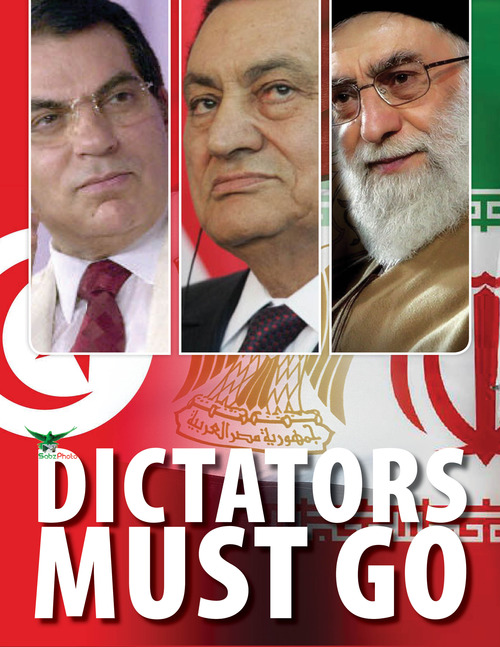
Tunisia's Ben Ali (left); Egypt's Hosni Mubarak (middle); Iran's Ayatollah Khamenei (right). From Mehdi Saharkhiz’s blog (http://onlymehdi.saharkhiz.net, January 27)
Bloggers affiliated with the reformist opposition also discussed the developments in Egypt. Similarly to the reactions stirred by the Tunisian coup, Iranian web surfers once again expressed frustration over the achievements of the popular protest movement in the Arab world compared to the failure of the reformist opposition in Iran.
One blogger compared Mohamed ElBaradei, one of the Egyptian opposition leaders, to Iran’s opposition leaders, Mir-Hossein Mousavi and Mehdi Karoubi. He noted that, unlike ElBaradei, who urges the Egyptian regime to step down and calls for the establishment of a new government based on democracy, Mousavi and Karoubi have not challenged the principles of Iran’s current regime, based on the concept of “rule of the religious jurisprudent”, settling instead for calls for partial reforms and a return to the constitutional principles of the Islamic republic (http://irangreenrevolution.wordpress.com).
Another blogger expressed his frustration by paraphrasing Shah Muhammad Reza Pahlavi’s eulogy for King Cyrus at the 2500 anniversary of Iranian monarchy in 1971 (“Sleep in peace, King Cyrus, because we are awake”). The blogger wrote the following on his blog (vivaparasi.blogspot.com): “Pharaoh, are you awake? Your people have risen up. Sleep, Cyrus, because we are all asleep”.



 RSS
RSS

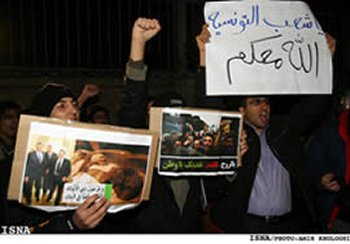
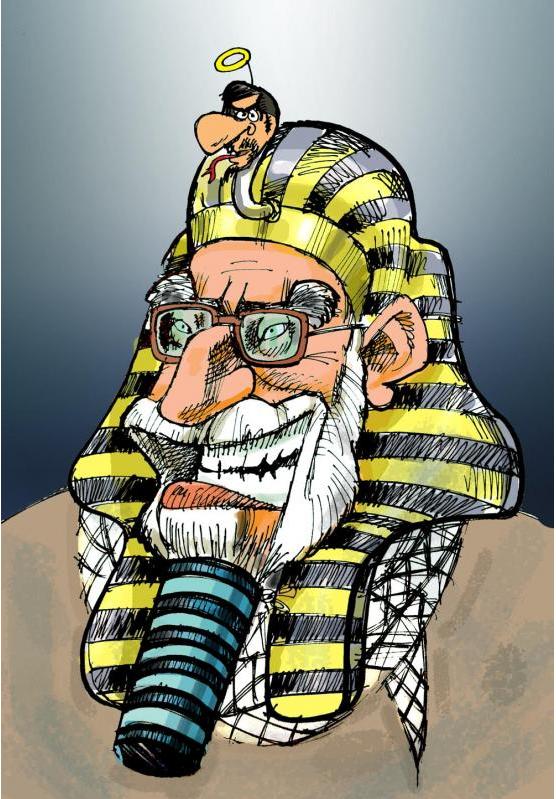

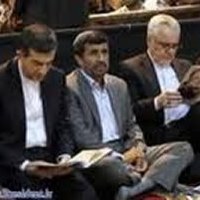


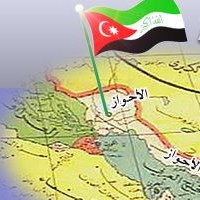




#Iran Regime Expresses Satisfaction over #Egypt #Revolt; Reformists Express Support, Frustration | http://j.mp/fI5gmW
RT @CrethiPlethi: #Iran Regime Expresses Satisfaction over #Egypt #Revolt; Reformists Express Support, Frustration | http://j.mp/fI5gmW
RT @CrethiPlethi: #Iran Regime Expresses Satisfaction over #Egypt #Revolt; Reformists Express Support, Frustration | http://j.mp/fI5gmW
RT @CrethiPlethi: #Iran Regime Expresses Satisfaction over #Egypt #Revolt; Reformists Express Support, Frustration | http://j.mp/fI5gmW